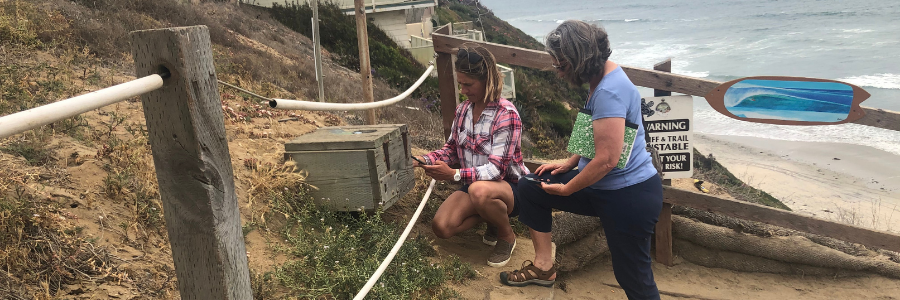School of Public Affairs Researches Beach Access in Encinitas

The SDSU Research Foundation has reported a new grant with the City of Encinitas to track beach access across different walking and cycling paths along the coast.
In 2012, Health and Human Services of San Diego County hired SDSU as part of the Putting Prevention to Work Campaign. Through the efforts of Dr. Sherry Ryan, the grant was used to purchase and install 30 Eco-Counters, the first ever automated bike and pedestrian counters in San Diego County. The data collected can be used to plan for long range infrastructure and to track walking and cycling patterns within the city.
Currently, the same research team, composed of Dr. Sherry Ryan and Diane Foote, are implementing the Eco-Counter technology to develop and protect coastline access in the City of Encinitas with the department of Infrastructure and Sustainability. The city currently has eleven counters installed that the SDSU research team oversees.
Foote explains the importance of this data and the impact it can make.
“One of the most important and sometimes overlooked components of pedestrian and bicycle data collection is maintaining the systems so that there is consistent and reliable data over time,” explains Foote. “This allows us to see trends, which can identify places to prioritize infrastructure improvements and show changes in use from those improvements.”
The Eco-Counters run on batteries, using inductive loops in the ground to count cyclists as well as an infrared beam to track pedestrians. The team has had the aid of four graduate Public Affairs students over the years in the installation, maintenance, and repair of the complex counter system.
“I’m passionate about helping cities understand activity levels across their jurisdiction and using this data to inform important decisions related to long range planning for public infrastructure and resources,” said Ryan. In particular, cities have very little information about walking and cycling levels and tend to underestimate the value of walking and cycling facilities in their communities.”
The head of the Department of Infrastructure and Sustainability hopes to develop the system and will eventually take over the maintenance of the technology. Cities can apply the valuable data collected to track travel trends and the impact of health campaigns on recreation levels. The City of Encinitas hopes to use the data to prioritize the rehabilitation of existing infrastructure and reduce the risk of bluff related incidents along the coast.
About The School of Public Affairs:
The SDSU School of Public Affairs is dedicated to supplying the region with well-educated, diverse, ethical graduates. The School both educates and trains undergraduate and graduate students in specific skills, techniques, and knowledge encouraging analytical and critical thinking about public and private sectors. We prepare students for the challenges of changing political and social environments. We are dedicated to advancing the commitment to public service and to providing applied scholarship designed to address emerging border and regional issues.
About the SDSU Research Foundation:
Established in 1943, San Diego State University Research Foundation (SDSURF) is a non-profit auxiliary corporation authorized by California’s Education Code to support San Diego State University. Our mission is to support and further the vision and research objectives of San Diego State University and to help faculty and staff find, attract and administer their research and sponsored programs.
The content within this article has been edited by Lizbeth Persons.

